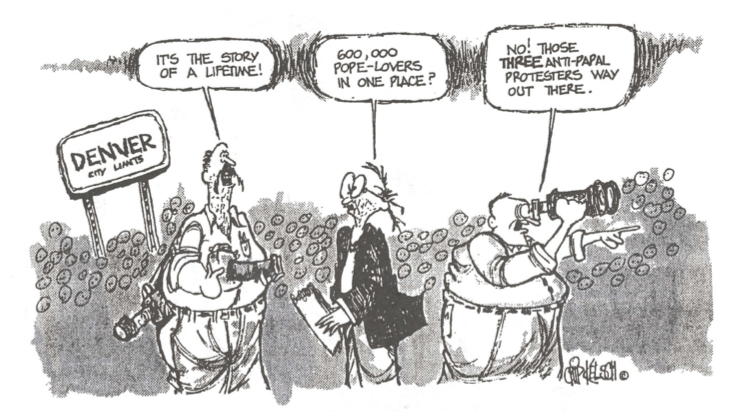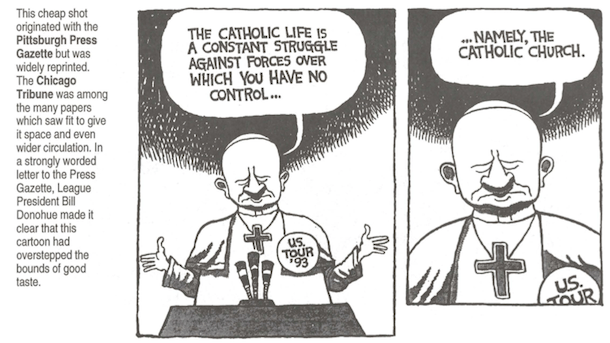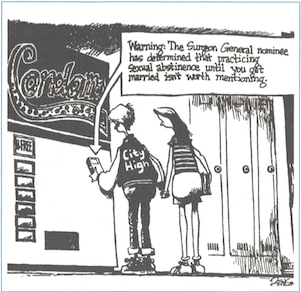by Karen lynn Krugh
Editor’s note: Karen Lynn Krugh recently joined our national office staff as an executive assistant. She attended World Youth Day in Denver and submitted this report for our readers.
Our nation has experienced division in many ways and for many years. Each generation, it seems, endures a period of tribulation and suffering when peers become foes and battles erupt. America’s young people today are no exception. We have witnessed and perhaps participated in social and spiritual battles across the country, from the streets of Los Angeles to the classrooms of New York City, from abortion clinics to scandals in our own churches. Our generation, Generation X, the Lost Generation, has given birth to phrases such as “Can’t we all get along?” and songs like “Cop Killer,” “I Want Your Sex,” and “Papa Don’t Preach,” among many others.
Yet, despite the recent crime wave in the city of Denver, despite the groups organizing to protest the Catholic Church and its stand on controversial issues, despite the inherent bias which would cloud the coverage by the mass media, despite the difficulty some experienced in explaining this journey to friends and loved ones back home, despite all circumstances which were against us, nearly 200,000 youth from every comer of the globe came together for five days as one body in Christ in Denver, Colorado for World Youth Day (WYD) 1993.
By today’s standards, what we did was unusual, perhaps even weird, if you were to ask some friends back home. A speaker at a catechetical session I attended quoted a confused friend who had said, “You’re going where? To do what? To see who? WHY?” The uproarious laughter which followed confirmed that many had experienced similar questioning.
We came together to show the world we had faith, and the Catholic faith at that. At a time when it seems our church is still an acceptable butt of jokes, when many think young people incapable of serious commitment, when “the church” is considered by some to be outdated and out of touch, we stood tall and we stood together. We defied convention.
“A great multitude which no man could number,” as our Holy Father quoted from Revelations (7:9) came together from North, Central and South America, from Asia and Africa, from Pacific rim nations and from Europe. We were greeted in fifteen languages. There were catechetical teachings in eight languages. For five days, we were a sign for one another, for the church and for the world, of the universal and unified church.

But all that power and love, all that conviction and the very message of World Youth Day is not what the national media chose to portray. Over and over again, in talking with friends and family back home, I heard about the protesters who were on TV, or the interviews with young people who were participating despite their disagreements with or disapproval of the Pope, or how the rain dampened our spirits and caused everyone to flee during the opening ceremony or how how the heat caused numerous medical emergencies and even deaths during the closing mass.
Because of my Catholic League connection, I was keeping an eye out for anti-Catholic sentiment, protests and literature. I repeatedly came in contact with and was referred to one organization – the Loving Way
United Pentecostal Church of Denver. No other organization – if there were any – was readily identifiable.
We encountered a few individuals along the way who shouted “Go! Worship your pope! Worship Mary! You’re all going to hell!” They held signs proclaiming “Beware False Prophets! (Mt. 7:15)” Members of my youth group responded “We’ll pray for you” and “We love you.” I don’t think this found its way into the news.
After mass on Sunday we encountered a silent, grinning man wearing a tilted foam miter who handed out “Wanted” posters with a picture of Pope John Paul II. Among other things the pope was wanted for being the Anti-Christ, for mutilating and murdering thousands during the middle ages, and for stockpiling an arsenal of weapons donated by cooperating countries. The man was unwilling to talk with us.
I had heard that Civic Center Park – renamed Celebration Plaza for the week – was the place to find protesters. But their presence was either greatly exaggerated by the media or else I managed to consistently miss them. Most of those I spoke with had neither seen nor heard any protesters . A few recalled some background noise during the opening mass but knew of nothing since that time.
The slogan printed on the straps we wore around our necks proclaimed “The Pope and young people. Together.” And anyone who witnessed the deafening welcome which the Holy Father received at his every appearance would be hard pressed to question his universal appeal and approval.
Yes, the American church appears to have more dissension in its ranks than other countries, but the majority of this great crowd was comprised of American youth and they were clearly in approval of their charismatic leader. The youth in Denver actively stood behind the Pope’s call to respect life. Some traveled to abortion clinics where they prayed. Still others volunteered to help Habitat for Humanity build housing for the poor. And we stood behind the pope’s call to be pil- grims, traveling first to Denver itself and then from site to site assisting our brothers and sisters along the way. And we became one body as we met other believers from around the world, worshipping and celebrating together, trading crosses and rosaries, stories and addresses.

For those of you who observed World Youth Day via the mass media, did you see: the different reactions received by the Holy Father and the president upon their arrivals at Stapleton International airport and again later when videos of their arrivals were shown at Mile High Stadium; the appearance of a huge rainbow over the stadium when the pope began to speak to the crowd gathered for the welcoming ceremony; the Italian group who, though sleeping in a parking garage, were still happy and excited enough to sing and dance for over an hour before their first catechetical; the Spanish group joined by youth from other nations who played guitars and tambourines and sang during the entire pilgrimage to Cherry Creek park; the enthusiastic participation of young people from war-torn, impoverished and former communist states -including Boznia-Herzagovinia – and the vast number from Vietnam; the tears of joy shed by Pope John Paul II and many, many of those who attended the Saturday evening prayer vigil; the crowd total given by announcers at the mass – between 500 and 750,000; the Holy Father’s excitement during the closing mass as he repeatedly went “off script” and reached for a microphone to ad-lib some heartfelt sentiment to the vast crowd; the generosity of the people of Colorado; the smiles of the pilgrims which accompanied each participant back to their own homelands?
Were you privy instead to: the protesters at Civic Center Park; excerpts from Clinton’s speech at the airport and details of his vacation; the dampened spirits caused by the rain and the quick exit of rain-soaked young people from Mile High Stadium; too much live “reporting” and not enough live tele- casting; the lack of adequate accommodations and the long food and restroom lines; the difficult pilgrimage conditions including cold, damp nights and oppressively hot days; the lower counts given of those attending the closing mass – 350,000; regular tallies of those fallen sick from Sunday’s heat?
I realize that the news media have time and space constraints on their reporting and that it’s impossible to be everywhere at once. But I do feel that I can legitimately object to the manner in which the media reported the event that was World Youth Day. If an event is 95% positive and 5% negative, is the media absolutely duty bound to seek out and cover the 5%? Must they look with such earnestness for that “other point of view,” or can they share an entirely positive story just once?
Did you hear the chant which followed the pope throughout his trip? It made its way onto banners and t-shirts and a host of other things. But did you see it on television? Or read it in the paper? For five days, everywhere he went, it was there, sometimes quietly, sometimes rocking an entire stadium: “J.P . II, we love you! J.P. II, we love you! John Paul II, we love you! John Paul II, we love you! JOHN PAUL II! WE LOVE YOU! JOHN PAUL II. WE LOVE YOU!”
If you listen, very carefully, you may still hear it echoing in your neighborhood.



